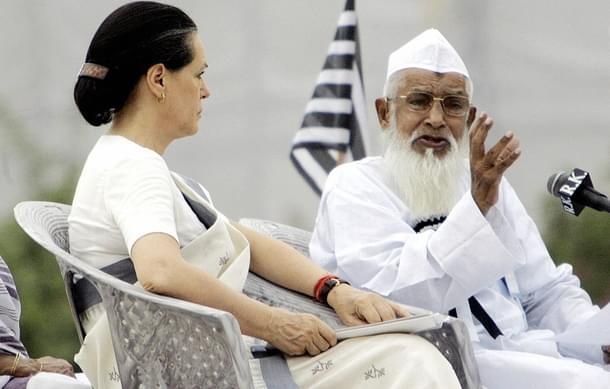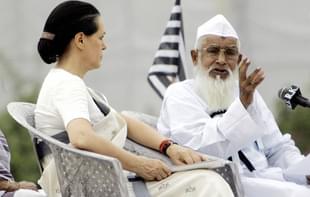Politics
Jamiat-Ulama-I-Hind Wanted To Convert India Into An Islamic state
Hari Om Mahajan
Mar 14, 2016, 04:11 PM | Updated 02:28 PM IST
Save & read from anywhere!
Bookmark stories for easy access on any device or the Swarajya app.


On 12 March, AICC president Sonia Gandhi attacked the Narendra Modi Government without naming it, vouched for secularism, the Left-style, and asserted that India was passing through a “critical phase as those in power are spreading hatred”. She, in addition, hailed Jamiat-Ulama-i-Hind (Association of the divines of India) as a genuinely patriotic association and also commended its contribution to the country’s freedom struggle along with Congress.
In fact, Sonia Gandhi sent a written message to this effect to the attendees of the Jamiat Ulama-i-Hind-organised “National Integration Conference” and it was read on her behalf by Leader of Opposition in the Rajya Sabha, Ghulam Nabi Azad. The conference was organised in Delhi in which many Congress and Left leaders also participated and spoke on the Muslim issue, on the ongoing debate on nationalism versus intolerance and on the need to further promote secularism of their own variety.
Sonia Gandhi was partly right and partly wrong when she commended the contribution of the Jamiat Ulama-i-Hind to the country’s freedom struggle along with the Congress. She was partly right when she said that the Jamiat Ulama-i-Hind participated in the freedom struggle along with the Congress, but she was wrong when she appreciated its role in the freedom struggle without pointing out its real intention. Perhaps, she was not aware of the real intentions of the Deobandi Ulama. Or, perhaps, her political advisors didn’t tell her as to what was the ultimate objective of the Jamiat Ulama-i-Hind.
What had induced or motivated the Jamiat Ulama-i-Hind, the political organ of the Deoband ulama, to support the Congress’ efforts to liberate India from Britain was its desire to controvert the influence of the All-India Muslim League on the Muslim society and convert India into an Islamic State.
The Deoband divines, who in 1867 had
founded Dar-ul-Uloom (House of Learning) at Deoband in the Saharanpur district
of the then United Provinces under the guidance of Maulana Mohammad Qasim
Nanawtawi as a counterpoise to Sir Syed Ahmad Khan’s west-oriented Aligarh
movement, along with advancing the Hanafi school of theology and impart instructions in
Islamic history and other old-fashioned disciplines, set up Jamiat-Ulama-i-Hind
in 1919 to play “more important role in the Khilafat movement and enter the
political field in their own right”.
The aims and objectives of the Jamiat Ulama-i-Hind were “to defend Islam, Islamic rituals and customs and Islamic nationalism against all odds injurious to them”; “to achieve and protect the general religious and national rights of the Muslims”; “to establish good and friendly relations with the non-Muslims of the country to the extent permitted by the Shariat-i-Islamiya”; and “to fight for the freedom of the country and religion according to the Shari objectives” (Sayyid Muhammad Mian, Jamiat-ul-Ulama Kia Hai, Part I, P.10).
The Jamiat Ulama-i-Hind supported the Congress as far as the cause of independence of India was concerned. It was its belief that the Muslim minority in India “need have no fear as once the British were gone, the Hindus would come to terms with it”. In 1928, the Jamiat Ulama-i-Hind rejected the Motilal Nehru Committee Report and withdrew from the movement. Its grouses against the Congress and the Nehru Committee Report were two: Inadequate safeguards for the Muslims and the adoption by the Congress of the Dominion status goal, instead of complete independence goal. The Dominion status for India was not consistent with its “commitment to complete independence” (Waheed-us-Zaman, Towards Pakistan, P. 177).
However, the Jamiat Ulama-i-Hind again turned to the Congress when it rejected the Dominion status objective and adopted “Puran Swarajya” goal in December 1929 at Lahore under the presidentship of Jawaharlal Nehru, Motilal’s son. It also offered fullest possible support to the Congress in 1937, when the latter organised Muslim mass contact programme.
The Jamiat Ulama-i-Hind was bitterly opposed to the Pakistan plan. Its arguments against the Muslim separatism were-
1) “The Pakistan demand has British support and is nothing but an instrument forged by them to further their policy of divide and rule; (2) “Pakistan will split and, therefore, weaken the Muslims in India; (3) our real enemy is British imperialism and our only duty to defeat it and only a united action can achieve this”; (4) “Muslims left behind India after separation will be at the mercy of the Hindus”; (5) “partition will hinder the missionary activities of the Ulema”; (6) “Muslim League leaders are ignorant of Islam, have no ideology, and are only exploiting the name of Islam for the worldly gains of Muslim vested interests”; and (7) “Muslim League leaders are incapable of building up an Islamic State and their Pakistan will be no better than the Turkey of Mustafa Kamal”.
All this should put things in perspective
and establish that the intentions of the Jamiat Ulama-i-Hind are highly
questionable. The very fact that the organisers of the event invited only those
who were bitterly opposed to the Narendra Modi Government and those who had
been openly and in a most brazen manner siding with the seditious elements in
Jawaharlal Nehru University since 9 February must clinch the whole issue and
establish that their intentions were not really pious. It’s time to call their bluff.
Hari Om Mahajan is former Dean, Faculty of Social Sciences, University of Jammu.





